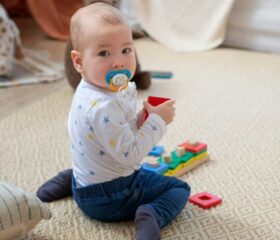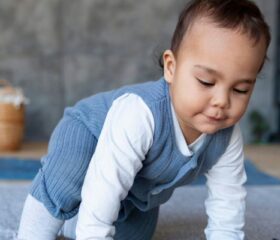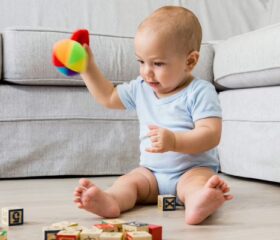When Do Babies Start Talking? Speech Milestones to Watch Out For
Of your baby’s milestones, talking is probably the one you’re most excited about, and you’ve got a front-row seat to watch her communication skills evolve.

It’s likely your baby won’t say her first word until she’s a toddler, but her language development actually begins way earlier than that.
When exactly will she say her first word, and what can you do to help her language development? Read on to learn what language skills to expect at different ages and what you can do to create a nurturing environment for your baby’s speech to develop.
When do babies learn how to talk?
Your baby’s language development starts much earlier than you might think—when she’s still in your womb!
Her ear structure may develop as early as the 7th week of pregnancy, and she may be able to hear and respond to sounds from the outside world, including your voice, by the time you’re around 24 weeks pregnant or 25 weeks pregnant. 1 2
Although it’ll take some time before your baby speaks, she’ll likely already be familiar with the rhythm and sounds of your voice when she’s born. With that in mind, keep talking, singing, and even telling her stories as much as you can during pregnancy.
When do babies start to babble?
Even before your baby says her first word, she’ll communicate with you in many other ways. This includes crying, cooing, smiling, gestures, and “babbling,” which is your baby’s first attempt at speaking.
Babies typically start babbling at around 6 months old. 3 Babbling is the foundation of her speech development. It acts as a bridge between cooing and talking and prepares your baby for saying actual words.
When she babbles, your baby uses her tongue, teeth, palate, and vocal cords to make different sounds. You may often hear her sigh and coo as she makes consonant sounds. Eventually, your baby will add in vowels, stringing sounds together like “ba-ba-ba” or “ma-da-ga.”
When do most babies say their first words?
Most babies utter their first recognizable word when they’re around a year old. However, that isn’t guaranteed; it’s perfectly normal if your baby says her first word a little later.
The first words babies say are often those that are most relevant to their world. Especially common first words include “mama,” “dada,” “bye-bye,” and “uh-oh,” and the names of familiar objects like “dog,” “cat,” “ball,” “car,” or “cup.”
If you have a partner, you’re both probably wondering whether she’ll say “dada” or “mama” first (and secretly hoping you’re picked first!) While some people believe the sounds in “dada” are easier to pronounce, there isn’t much research backing this up. It varies from baby to baby; you just have to wait for your baby to surprise you.
Bilingualism won’t cause language delays
Your baby’s brain is smart enough to distinguish between multiple languages. 4 If you can raise her in a bilingual environment, go for it. Research shows that bilingualism is linked to several advantages, including better cognitive abilities, improved academic performance, and more career opportunities. 5
Your baby’s language development timeline
Every baby develops at their own pace. However, there’s still a rough, general timeline you can expect your child’s language skills to follow.
Here’s what you can expect up to two years of age:
Birth to 3 months
At this stage, crying is your baby’s main way of communicating. You’ll quickly learn to distinguish between her different cries and figure out if she’s hungry, uncomfortable, or sleepy—they probably won’t sound quite the same.
Your baby may also coo, producing different soft, gurgling sounds depending on how she feels.
As well as making noises, your baby is alert to sounds. She may recognize your voice and go quiet or smile when you talk by the time she’s 3 months old. When people are talking within earshot, she might look towards them.
4 to 6 months
Between 4 months old and 6 months old, your baby is rapidly acquiring receptive language. This means she can understand more than she can say. She may respond to changes in your facial expressions and tone of voice.
As discussed earlier, this is usually when babies start babbling. You’ll find her blowing “raspberries” and experimenting with sounds, combining consonants and vowels like “ba-ba,” “ma-ma,” or “da-da.” Get your camera ready—there will be plenty of adorable moments you’ll want to preserve!
Playtime also gets louder and more interesting in this period. She may vocalize as she plays and react to musical toys or objects that make sounds, such as bells. If you wave an item in front of her, her eyes may follow it. You’ll have a small copycat, with her attempting to mimic many of your moves.
7 to 9 months
Your baby now understands more and more words and phrases. She may look at you when you call her name, and she might even understand what the word “no” means (a big and very useful milestone).
You may notice she recognizes the names of familiar people and objects by 9 months old. She’ll also intentionally look for you or other loved ones when upset. Her babbling is more dynamic with longer sounds, such as “mamamama” or “babababa.”
Don’t forget that physical gestures are also part of her communication. She may raise her arms when she wants you to pick her up and push things away when she doesn’t want them.
10 to 12 months
As your baby nears her first birthday, she gets increasingly interactive. You’ll see her point, wave, show, give, or reach for objects. You can play games like peek-a-boo and blow kisses back and forth with her.
Your little copycat now not only imitates your moves but also your sounds. Moreover, she may associate words with actions, such as when you wave “bye-bye” to her.
Lastly—this is the most exciting part—she’ll probably say her first words around this time, whether that’s “mama,” “dada,” or something else.
13 to 18 months
Your toddler (no longer a baby!) can now follow directions like “Come hug mommy,” “Give me the blanket,” or “Show me your hand.” When you ask her “where” questions, such as “Where’s your teddy bear?”, you’ll see her head swivel around.
She’ll be even more adept at communicating with gestures. She may point at things she wants, clap when she’s excited, and shake or nod her head to show her preference. That adorable personality of hers really starts to shine around this time, and you may catch her making silly faces to other people.
Talking-wise, your toddler is collecting more and more vocabulary each day. Don’t worry if her pronunciation is imperfect. The important thing is that she’s practicing and improving this skill. Most likely, you’ll still be able to understand her words, even when others can’t.
19 to 24 months
This is an especially fun period during which you’ll witness rapid language growth in your toddler. She’s picking up new words quicker than ever and combining them into simple phrases, such as “more milk,” “go out,” or “where that.”
She may already know 50 words or even more, which will mainly refer to food, toys, animals, and body parts. 6 Words like “me,” “mine,” and “you,” and possessives like “Mommy’s book” might slip into her speech. All of this means that she can finally use language, not just gestures, to ask for help.
From here, her vocabulary will continue expanding. Be prepared to hear her say longer sentences with three or four words and follow more complex directions as she grows older. Note that some boys’ language skills develop slightly later than girls, but it isn’t anything to worry about. 7
How to help your baby’s language development
Again, your child will develop her language skills at her own pace. There’s no need to rush her. However, you can help her master them with the following strategies:
- Talk, talk, talk: Above all, don’t stop talking. The more you talk to your baby, the more words she’ll learn. You don’t necessarily need to say anything particularly interesting. Just narrate your day, such as what you’re doing as you change her diapers, prepare a meal, or go for a walk.
- Read aloud: It’s also never too early to start reading to your baby. Choose colorful board books with simple pictures and engaging stories. You can point to objects and name them as you read to teach her what they are.
- Sing songs and rhymes: The repetition and melodies of songs and rhymes teach your baby new words and sounds. Be prepared to do it over and over again until you go mildly insane!
- Use names, not just pronouns: Using specific names helps your baby associate words with people. For instance, instead of saying, “Give it to me,” say, “Give the ball to Mommy.”
- Enunciate clearly: Speak slowly and clearly to emphasize the sounds of each word. Doing so helps your baby learn how to pronounce words correctly.
- Repeat, repeat, repeat: Babies learn through repetition. Be patient and repeat words and phrases often. Keep pointing out the same objects each time you see them.
- Listen attentively: When your baby babbles or makes sounds, respond enthusiastically. Make eye contact with her to show you’re interested and listening. These small actions can encourage your baby to keep communicating.
- Give her time to respond: Don’t forget that talking is new to your baby. She needs time to process what you’re saying and think about how to respond correctly. When talking to her, pause regularly to see if she has any sounds, words, or gestures to offer up.
- Incorporate baby sign language: This is a great way to help your baby’s language development. Always remember to say the word with its accompanying sign to encourage her to speak as well.
With all of this, do your best to make it fun. Play games, make silly sounds, and use funny voices. The more fun you make communicating, the more engaged your baby will be, and the quicker she’ll develop her language skills.
What to avoid doing
On another note, screen time isn’t a substitute for genuine human interaction. While you may think some educational programs are beneficial, they can’t replace real-life interaction, and most experts suggest that you avoid screens altogether until your baby is at least 15–18 months old. 8
Additionally, don’t use baby talk with your child all the time. Using a sing-song voice and simplified language is helpful, but you should also try speaking to her with correct grammar and pronunciation.
When should you seek professional help?
When it comes to language development, there’s a wide range of normal. Some babies are early talkers, while others take their time.
Still, pay attention to warning signs that suggest your baby has a language developmental delay and isn’t just a late talker. Track your baby’s milestones in your journal or baby tracker app, and consult your pediatrician if your child:
- Doesn’t respond to loud sounds by 2 months old
- Doesn’t coo or make sounds by 4 months old
- Doesn’t babble by 9 months old
- Doesn’t respond to their name by 9 months old
- Doesn’t say single words like “mama” or “dada” by 12 months old
- Doesn’t say at least five words by 18 months old
- Isn’t making two-word sentences by 24 months old
- Experiences a sudden loss of language skills at any age
Language developmental delay is the most common developmental delay among children. In fact, one in 5 children’s language development is slower than that of their peers. 9
In some rare cases, the delay is linked to a larger problem, such as hearing loss, autism spectrum disorders (ASD), or another type of developmental delay. Let your pediatrician know if your family has a history of hearing loss in infants or young children, as it may increase the risk in your baby. 1
What to expect during an evaluation
If your pediatrician is concerned about your baby’s language development, they may refer you to a pediatric speech-language pathologist for an evaluation. The evaluation may include:
- A hearing test
- A speech and language assessment
- An overall developmental screening
As with any other medical condition, the key is early intervention. The sooner speech or language delays are identified and addressed by a professional, the better the outcome for your child will be.
Final thoughts
Watching your baby learn to talk is fascinating. From her cute cooing to silly babbling to bubbly first words, you’ll be there every step of the way. Before you know it, you’ll be having full-blown conversations with her!
In the meantime, encourage her efforts and create a supportive environment where your little one feels comfortable expressing herself. If you have any concerns, don’t hesitate to pay your pediatrician a visit.
Article Sources
- Utah Early Hearing Detection & Intervention. "Prenatal: Newborn Hearing Screening" Retrieved October 27, 2025.
- Centers for Disease Control and Prevention. "About Noise and Reproductive Health" Retrieved October 27, 2025.
- MI Kids Matter. "Development & Milestones for Infants (Birth - 12 months)" Retrieved October 27, 2025.
- City of Chicago. "Bilingualism (retrieved from archive.org)" Retrieved October 27, 2025.
- Nebraska Department of Education. "Benefits of Being Bilingual" Retrieved October 27, 2025.
- American Speech-Language-Hearing Association. "Communication Milestones: 19 to 24 Months" Retrieved October 27, 2025.
- Women's Health Research Institute. "Why Boys Talk Later than Girls: Hormones?" Retrieved October 27, 2025.
- City of Chicago. "Screen Time" Retrieved October 27, 2025.
- HealthyChildren.org. "Language Delays in Toddlers: Information for Parents" Retrieved October 27, 2025.







